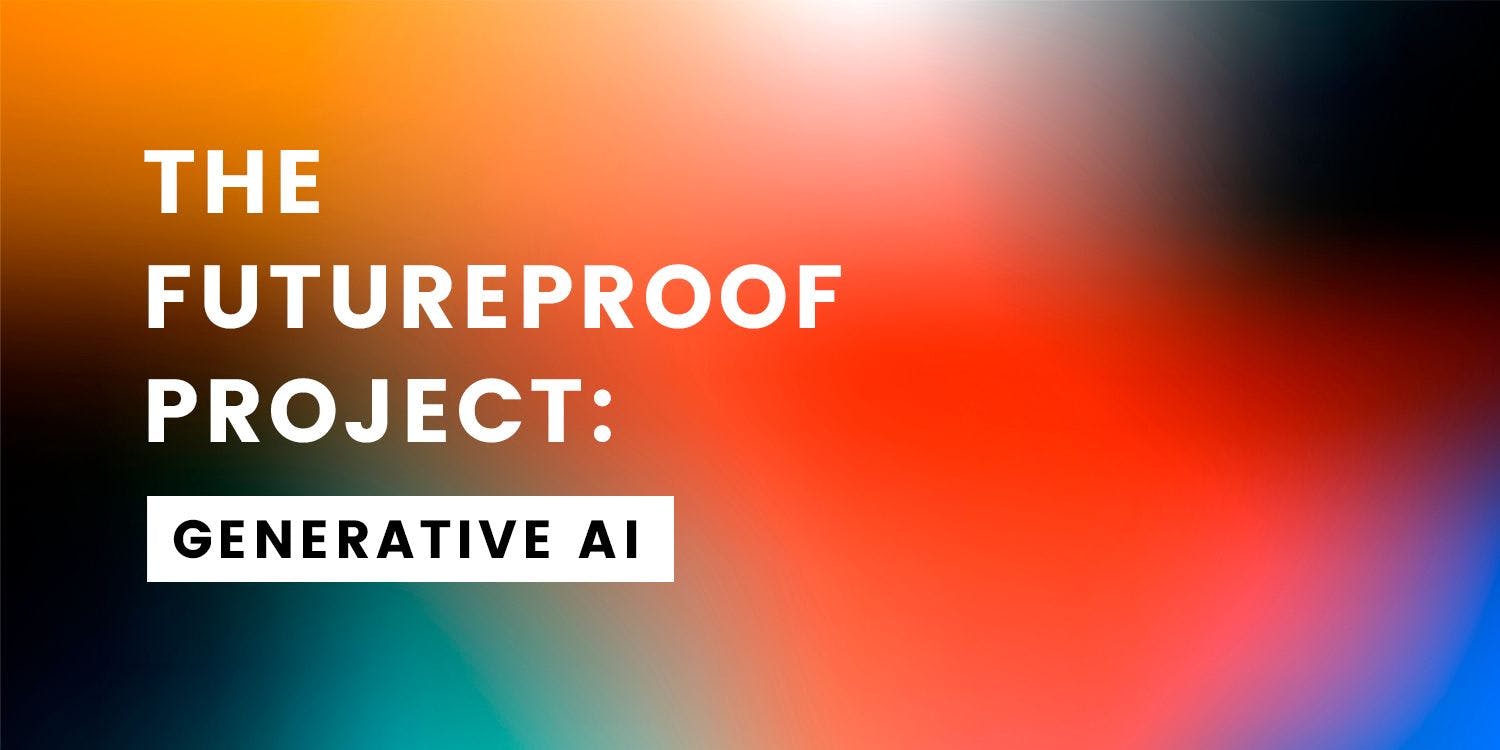The Futureproof Project: Savvy Marketing in the AI Era

By Adam Kleinberg
Our latest Futureproof Project event in San Francisco, "Savvy Marketing in the AI Era," was a profound exploration of how AI reshapes our understanding of marketing, innovation, and societal norms. I had the honor of sitting down with Shiv Singh, a vanguard in the intersection of marketing and digital innovation.
With an extensive background that spans leadership roles at Pepsi, Visa, and Lending Tree, and as an author of seminal works including the upcoming "Marketing with AI for Dummies," Shiv's insights into the evolving landscape of AI in marketing are both profound and prescient.
As we discussed the implications of AI for the future of marketing, several themes emerged. Let’s dive deeper into these insights:
The Unseen Depths of AI’s Impact
"AI is actually massively underhyped," Shiv provocatively began, setting the stage for a discussion that would challenge our preconceptions. His observation that we stand on the "precipice of explosion" in AI technology served as a compelling reminder of the transformative potential that lies ahead.
He juxtaposed the day's achievements, like Nvidia's revenue surge and a historical lunar landing, against mundane yet significant challenges, such as widespread cellular outages. This contrast served as a potent reminder of the unpredictable trajectory AI might take us on, emphasizing the blend of monumental advancements and practical challenges.
Ethical Implications and the Need for Governance
Shiv Singh's insights into the ethical considerations of AI were particularly poignant. Shiv illuminated the promising horizon of AI, from medical breakthroughs to the automation of tedious tasks, heralding a future where human ingenuity is amplified by artificial intelligence. As marketers, we find ourselves at the forefront of deploying technologies that have the power to influence public opinion and behavior on an unprecedented scale.
However, he was equally candid about the darker potentials of AI, particularly the ease of creating deepfakes. "Private companies and private corporations don't have enough self-interest, motivation, or know-how to give them the benefit of the doubt to protect us as human beings," he cautioned, highlighting a crucial gap in the current trajectory of AI development.
Shiv's reflections underscored the imperative for ethical frameworks that guide AI's application in marketing, ensuring that while we pursue efficiency and innovation, we also safeguard the values of transparency, consent, and respect for individual privacy.
Envisioning a Creative Renaissance
A particularly captivating aspect of our discussion was the envisioned "creative renaissance."
Shiv posited that AI, by democratizing the tools of creativity, would supercharge human imagination. However, he also noted the elevation of the creative benchmark, suggesting that breakthrough work would require an unprecedented synthesis of human creativity and AI's capabilities.
“Creative thinkers with AI tools [are] going to get incredibly, mind-blowingly supercharged because it's going to be easy for everyone to do the bare basics…But to create groundbreaking work, whether it's in marketing or new product development or new operations, it's going to take the smartest people in the world with the smartest AI tools and engines and co-pilots at their disposal. And so I believe it's going to lead to a whole amazing creative renaissance of a kind we've never seen before.”
This perspective offers a hopeful vision of AI as a catalyst for a new era of innovation and creative expression.
The Role of Expertise in an AI-Enhanced World
The conversation also touched on the evolving role of expertise in leveraging AI tools effectively. The ability to craft effective prompts and guide AI towards productive outcomes hinges on a deep understanding of both the technology and the creative process. This intertwining of expertise underscores the shifting skill sets required in an AI-enhanced world, where the value of human insight becomes paramount in maximizing the benefits of generative AI.
The Enduring Relevance of Marketing
Despite the transformative impact of AI, Shiv affirmed that the core of marketing—shifting attitudes, perceptions, and behaviors—remains unchanged.
"We as human beings are fundamentally irrational. As long as we stay irrational, there'll always be a place for marketing," he remarked, acknowledging the innately human aspects of persuasion and influence that AI cannot supplant. This reassurance serves as a reminder that at the heart of marketing lies the capacity to connect with and move people, a domain where human insight remains paramount.
Preparing for a Future Shaped by AI
The "Savvy Marketing in the AI Era" event was more than a conversation; it was a deep dive into the transformative impact of AI on marketing and society. Shiv Singh's expertise offered us a comprehensive understanding of this impact, weaving together the threads of innovation, ethics, and human creativity.
Looking ahead, this discussion serves as a clarion call for marketers to prepare for a future increasingly shaped by AI. This preparation goes beyond merely understanding the technological aspects; it involves cultivating a mindset that is open to continuous learning, ethical consideration, and creative exploration. As AI continues to evolve, so too must our strategies, tools, and approaches to marketing. Embracing this change requires not just adaptation but a proactive stance in shaping how AI integrates into our work and impacts society.
Our journey with AI is just beginning, and the road ahead is as challenging as it is exciting. Together, with thought leaders like Shiv Singh guiding the discourse, we can harness AI's potential to not only transform marketing but also enrich the human experience in profound ways.
Thank you again to Shiv Singh for his invaluable contributions and to all those who participated in this enlightening event. The dialogue we've started here is crucial, and I look forward to continuing this conversation as we all venture further into the AI era.
Key Takeaways
Generative AI is Underhyped: Marketers must prepare now for the "precipice of explosion" in AI technology by cultivating a mindset of continuous learning and proactive preparation.
Mandate AI Ethical Governance: Ethical frameworks ensuring transparency and consent are critical, as private corporations lack the self-interest to protect human beings from "darker potentials," such as deepfakes.
Ignite the Creative Renaissance: AI will supercharge human imagination, but creating groundbreaking work demands synthesis between the smartest people and the smartest AI tools and co-pilots.
Human Insight is Paramount: The core of marketing remains unchanged because human beings are "fundamentally irrational". Expertise and human insight are crucial for crafting effective prompts and guiding AI toward productive outcomes.
Frequently Asked Questions (FAQs) for AI Marketing Strategy
Q1: How is Generative AI currently impacting marketing strategy, according to Shiv Singh?
A1: Shiv Singh, a vanguard in digital innovation, provocatively stated that AI is "massively underhyped", even as achievements like Nvidia’s revenue surges occur. He suggests marketers are standing on the "precipice of explosion" in AI technology, emphasizing the blend of monumental advancements and practical challenges. Proactive preparation and cultivating a mindset open to continuous learning are crucial for marketers to prepare for this transformative impact.
Q2: Why is AI ethical governance critical for marketers utilizing generative AI?
A2: Ethical frameworks are imperative because private corporations may lack the necessary "self-interest, motivation, or know-how to... protect us as human beings" from "darker potentials," such as deepfakes. Shiv Singh’s insights underscore the need for AI ethical governance in marketing to safeguard the core values of transparency, consent, and respect for individual privacy while deploying influential technologies.
Q3: Will AI lead to a "creative renaissance" in marketing?
A3: Yes, Shiv Singh posits that AI will democratize creative tools, leading to an "amazing creative renaissance" by supercharging human imagination. However, he notes that this elevates the benchmark for quality: creating truly "groundbreaking work" will require an unprecedented synthesis of the world's "smartest people" combined with the "smartest AI tools and engines and co-pilots".
Q4: Does human expertise remain relevant in an AI-enhanced marketing world?
A4: Absolutely. Despite AI's transformative power, the core of marketing—shifting attitudes, perceptions, and behaviors—remains relevant because "We as human beings are fundamentally irrational". The enduring value of human insight and deep expertise is paramount for maximizing the benefits of generative AI, particularly in crafting effective prompts and guiding AI toward productive outcomes.

This week, Digiday wrote a story on how Traction is revolutionizing client services with former brand-side talent and how Lauren Evans joined Traction and was promoted to lead our client service team after spending 9 years growing lululemon from a $500M to a $6B business.

It’s no surprise that marketing is one of the first disciplines to embrace generative AI. In a recent State of Generative AI Survey by risk management platform Portal26, 68% of respondents in the marketing, media and sales categories believed generative AI would give their organization a significant competitive advantage.

There are 58,000 AI companies in the world today. 17,000 of them are based in the United States. That’s a lot. Marketers tend to keep up with technology more than most. I’d guess that half the people reading this are already using ChatGPT on a daily basis.
